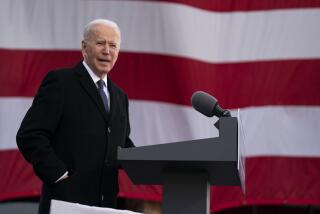Bush Seeks Volunteer Efforts Against Social Ills
- Share via
NEW YORK — President Bush, declaring that “there is no problem in America that is not being solved somewhere,” called Thursday for voluntary efforts to fight social ills.
“Today, more than ever, we need community service to help dropouts, pregnant teens and drug abusers; the homeless and AIDS victims; the hungry and illiterate,” Bush said in a speech to business leaders here designed to fulfill his campaign promise to encourage a “thousand points of light.”
Thursday’s call for volunteer service had its origins in a campaign effort to promote a compassionate image for Bush, one that his advisers successfully designed to appeal to voters who were troubled by the Ronald Reagan Administration’s often dismissive attitude toward homelessness, poverty and other social problems.
Plan Has Changed
At the time, the centerpiece of the idea was a form of domestic peace corps, a program that would recruit teen-agers to go into poor neighborhoods and work with their peers against drug abuse and other problems.
In the months since the campaign, however, that idea has been scaled back and Bush’s proposal as announced Thursday was more modest: presidential awards for successful volunteer programs, “leadership forums” for community activists and a foundation that would spend $100 million in tax funds--plus additional private contributions--over the next four years to seek out successful volunteer efforts and publicize them nationally.
“If you see this as a government program, you don’t see it,” said Bush aide Gregg Petersmeyer, who heads the White House Office of National Service. “This is not a federal program; it’s a movement with a foundation as a catalyst.”
Many leading Democrats, by contrast, have been backing proposals that involve a more active federal role. And some party strategists have suggested that the difference between the two approaches toward national service could become a major topic for political debate in the 1990s.
The Democratic approaches generally have involved setting up government-run youth service programs that would provide an array of benefits to young people in return for community service of a year or more.
Bush allies argue that his approach will succeed because it avoids bureaucracy and “touches a nerve,” as New Jersey Gov. Thomas H. Kean said to reporters Thursday. “There’s a hunger in this country, particularly among our young people, to do something for someone else,” Kean said.
Kean will head a committee that will advise Bush on how to implement his ideas. Bush called him at 10:30 p.m. Wednesday to ask him to take on the job, Kean said.
Bush’s approach reflects a belief shared by him and his aides that traditional charitable endeavors such as the United Way and the YMCA, rather than government programs, are the key to battling poverty, drug abuse and homelessness.
Critics, however, argue that Bush’s approach will not accomplish much that the private sector would not have done anyway and that more direct government action is needed to solve social problems. Many of the problems Bush wants to combat, the critics note, have been badly aggravated over the last eight years by social program cutbacks, which Bush has continued.
A major example of the debate involves homelessness, now involving a population “larger than in the Great Depression,” according to a White House-approved videotape shown to the business leaders just before Bush spoke.
Democrats have argued that Reagan-era cutbacks in federal housing programs led directly to the growth of homelessness. Bush, however, made his view clear during his speech.
“All my life,” he said, “I’ve believed that government could not substitute for ‘do unto others.’ ”
Later in the day, Bush attended a fund-raising dinner for the New York State Republican Party and a celebratory dinner for the 100th anniversary of the Wall Street Journal.
The President had to change his route out of New York City on Thursday night after a truck carrying potentially explosive and toxic chemicals overturned near Newark International Airport.
Air Force One was flown from the Newark airport to John F. Kennedy International Airport in Queens, about 25 miles away, to pick up Bush because of security concerns, White House Press Secretary Marlin Fitzwater told reporters traveling with the President in New York.
More to Read
Get the L.A. Times Politics newsletter
Deeply reported insights into legislation, politics and policy from Sacramento, Washington and beyond. In your inbox twice per week.
You may occasionally receive promotional content from the Los Angeles Times.











